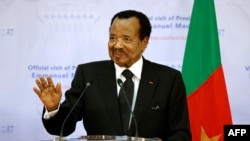Cameroonian journalists say they are grappling with a new government directive prohibiting public discourse or media coverage of President Paul Biya’s health.
The ban, issued by Territorial Administration Minister Paul Atanga Nji on October 9, follows media speculation about the 91-year-old president’s absence from public view. The directive has sparked debate within Cameroon’s media, which faces a critical choice of whether to adhere to the ban and avoid retaliation or continue reporting on matters of public concern.
VOA’s Cameroon reporter Moki Edwin Kindzeka said that responses among journalists varied. "Some have ignored the ban and continued reporting on President Paul Biya’s long absence, [and] ill health," he said. "Others are scared, some have been silent on the issue," he added, pointing out that authorities are closely monitoring media coverage and increasing the pressure on journalists who must navigate a restrictive landscape.
Another freelance reporter for VOA’s French to Africa Service, journalist Emmanuel Jules Ntap, said media organizations are being cautious.
"Journalists are scared, and media organizations are being careful. No one is talking about the health of the president," he said, capturing what some media advocates are characterizing as self-censorship.
"The press is speaking about his long absence from the country but not his health," he added.
The ban has drawn strong reactions from international press freedom organizations.
Reporters Without Borders condemned it as an "act of intimidation and censorship."
The Committee to Protect Journalists echoed these concerns.
"Using national security as the reason to censor is a favorite government tool. If you look at the amount of coverage that the latest ban on reporting about Biya’s health has received, it’s by far the international media and journalists outside the country who are reporting on it," head of Africa Program Angela Quintal told VOA, adding that the restriction is part of a broader trend in Cameroon.
The directive adds to an ongoing pattern of press suppression, Quintal said. She added that local journalists face pressure to self-censor, which is a common issue in Cameroon, especially ahead of next year’s elections.
Cameroon’s history of media repression is well-documented. Over the years, journalists have faced threats, imprisonment, and even death for covering politically sensitive topics such as corruption or conflict.
There are at least five journalists currently imprisoned on charges linked to their reporting, including those who have covered the country’s conflict in the English-speaking Northwest and Southwest regions, according to CPJ. These journalists are often detained under anti-state charges and, in some cases, tried in military courts.
One such journalist who knows too well what Cameroonian prison is like and is now exiled in Europe is Cameroonian journalist Mimi Mefo Newuh, founder of the independent news outlet Mimi Mefo Info.
"By linking this ban to national security simply means that violators, anyone who dares talks about the health of the president of the Republic will be charged," she said. "Using the 2014 anti-terrorism legislation in Cameroon and you know what has happened to even journalists like myself."
VOA reached out to the National Communication Council and the prime minister’s office for comment and email inquiries went unanswered.
The risks associated with reporting on controversial topics have driven many Cameroonian journalists to self-censor. In 2018, Samuel Wazizi, a journalist who covered the Anglophone crisis, died in government custody, allegedly due to torture. The 2023 murder of Martinez Zogo, known for exposing corruption, further highlighted the dangers faced by journalists.
Angela Quintal pointed out that international journalists have been covering the ban more extensively than local media, underscoring the limitations imposed on Cameroonian reporters.
"By issuing the ban, the government only fueled the speculation and made it a story of international interest," she said. "The Cameroonian state media are silent, while a few private media outlets, journalists, have been brave enough to ask the question that is every Cameroonian's right to know, where is the president and what are the circumstances of his health?"
Mefo said that the situation reflects a recurring theme in Cameroon. "This is not the first time it’s happened in Cameroon," she said. "The reason why this one is peculiar and why it's also making news is the fact that it’s not just about the health of the president, it is also about his whereabout where he is, and whether he’s actually fit to continue being president of the country."
Mefo highlighted the challenges faced by journalists covering Biya’s health amid the ban.
"The media, including social media platforms, were stopped from reporting about the health of the president. Even ordinary Cameroonians were warned against doing that," she said.
Many programs that would typically discuss this topic have shifted to other subjects, and citizens are cautious about posting anything online for fear of reprisal. "Most of their programs were talking about something else, whereas the main topic at the moment is about President Paul Biya," she said.
The ban on covering Biya’s health is only one aspect of a wider crackdown on press freedom in Cameroon. The government has used laws against criminal defamation, false news, and anti-state charges to silence dissenting voices. In recent years, journalists have been jailed, attacked, and forced into exile. The National Communication Council, the country’s media regulatory body, frequently imposes restrictions and penalties on news outlets that criticize the government or address sensitive issues.
"Cameroon is among the worst jailers of journalists in sub-Saharan Africa," Quintal said. She added that reporting on issues such as the Boko Haram insurgency, the Anglophone crisis, and corruption is especially dangerous for journalists.
Despite these challenges, advocates say journalists continue to find ways to report on pressing issues. Mefo described how her team has adopted security measures to protect reporters covering the president’s health. "We had to engage in additional security measures after the ban, like changing the names completely, because usually my reporters use pseudonyms to write," she said.
This story originated in VOA’s Africa Division. French to Africa’s Abdourahmane Dia contributed to the report.






